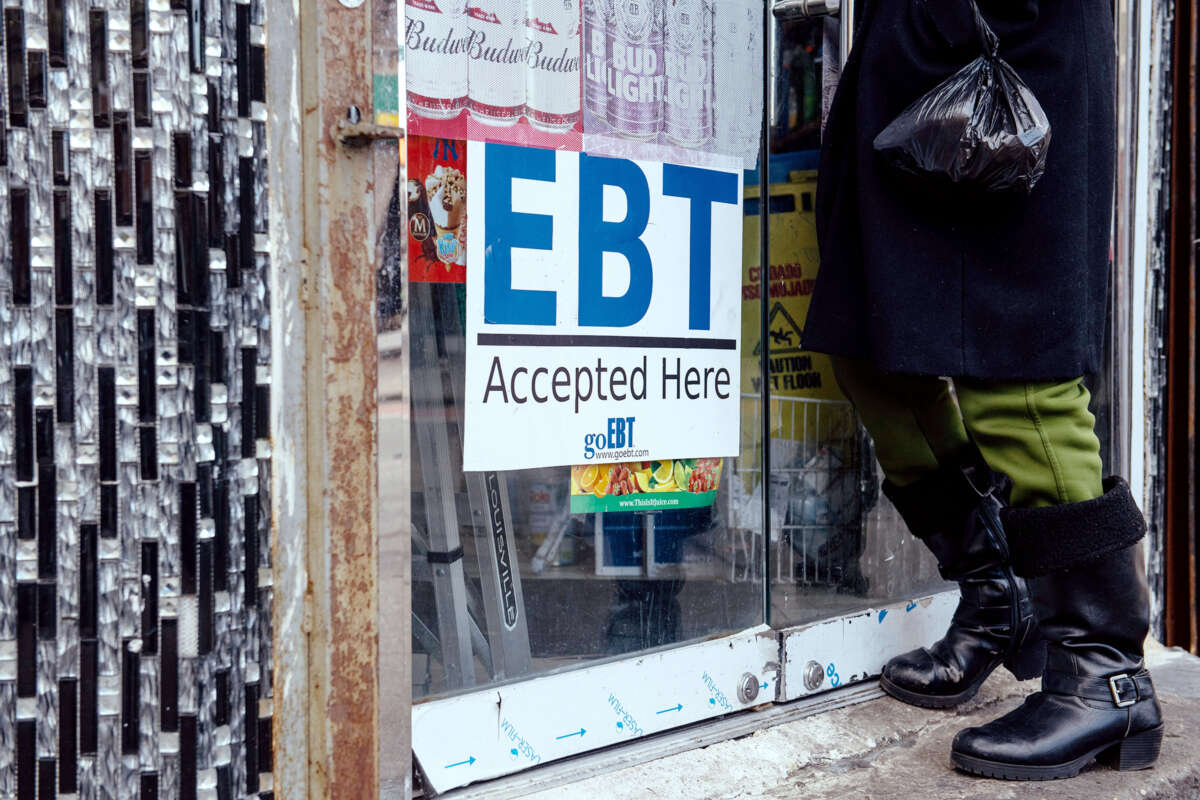Honest, paywall-free news is rare. Please support our boldly independent journalism with a donation of any size.
According to a new analysis conducted by the Urban Institute, a Washington, D.C-based think tank specializing in economic and social policy research, Supplemental Nutrition Assistance Program, or SNAP, benefits did not cover the cost of a modestly-priced meal in 98% of United States counties last year.
This analysis, which was funded by the Robert Wood Johnson Foundation, included data from 2023 and found the U.S. Department of Agriculture’s annual cost-of-living adjustment had little effect on the adequacy of SNAP benefits that year; researchers also discovered that in the last quarter of 2023 a “19% shortfall existed between the $3.37 cost of a moderately priced meal and SNAP’s average maximum benefit.”
This was true across the majority of the country, though in counties with the largest gaps — New York County, N.Y.; Leelanau County, Mich.; Teton County, Idaho; and Dukes County and Nantucket County, Mass. — there is a staggering 70% disparity between SNAP benefits and meal costs.
“Food insecurity increased for the second straight year in 2023 after inflation rates remained higher than average and household budgets stayed tight,” Elaine Waxman, a senior fellow at the Urban Institute said in an emailed statement. “For many families, SNAP provides them with the support they need to keep food on the table.
She continued: “Our research shows SNAP benefits did not cover the cost of a meal in 98% of counties in 2023. With the Farm Bill up for reauthorization, potential cuts to SNAP could be devastating for families with low incomes, who are already struggling with food insecurity.”
Waxman brings up the incredibly important point — one that’s been consistently raised by food security advocates over the last few months. The Farm Bill, which funds SNAP, expires in September, meaning that it’s a crucial time to assess whether the program is actually meeting the needs of its participants. However, there’s a distinct possibility that Republican legislators will attempt to cut funding to SNAP even further, which could have a devastating impact on hunger in America.
As Salon Food reported, House Agriculture Committee Chairman Glenn “GT” Thompson, a Republican from Pennsylvania, has proposed a funding framework for the Farm Bill that includes a $30 billion cut in Supplemental Nutrition Assistance Program benefits over the next decade. The proposal would limit future updates to the Thrifty Food Plan, which is used by the United States Department of Agriculture to set SNAP benefits.
Last Monday, after more than a year of hearing and listening sessions, Thompson released a title-by-title overview of his Farm Bill draft — which has already gained significant support from Republican lawmakers — and scheduled a markup of the legislation for May 23rd,
Thompson has argued his proposal is not a “real cut” because average benefits would still rise incrementally alongside food inflation, but food insecurity experts continue to push back on that assertion, both because the new Urban Institute data shows current funding is already out of step with with the cost of healthful meals, and because America is already in the midst of a worsening hunger crisis.
New data seems to drop every week that indicates this would be the absolute worst time for cuts. For instance, Feeding America’s annual Map the Meal Gap report was released on May 15 and found that “the extra amount of money that people facing hunger said they need to have enough food reached its highest point in the last 20 years.”
“People facing hunger said they need an additional $24.73 per week in 2022, a 9.5% increase after adjusting for increased prices,” the report found. “Nationally, the amount needed among all 44 million people facing hunger in 2022 hit a record high of $33.1 billion, up nearly 43%. This increase suggests that rising prices, especially food prices, likely contributed in part to the increase in need.”
“In recent years, the data show that more and more people cannot keep up with rising food prices and are struggling to feed their families,” Gina Hijjawi, a senior program officer at the Robert Wood Johnson Foundation, said in an emailed statement. “Any reductions in SNAP funding will make it even harder for people and families to make ends meet, potentially increasing the number of households facing food insecurity. Because children and marginalized groups are most at risk to food insecurity, this would only exacerbate the already stark health disparities that exist along geographical, racial, and economic lines.”
Media that fights fascism
Truthout is funded almost entirely by readers — that’s why we can speak truth to power and cut against the mainstream narrative. But independent journalists at Truthout face mounting political repression under Trump.
We rely on your support to survive McCarthyist censorship. Please make a tax-deductible one-time or monthly donation.
